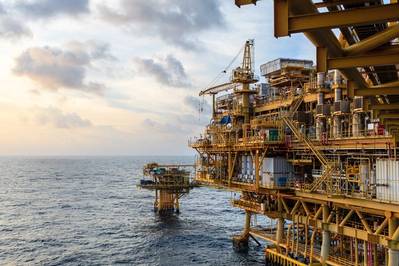Total CEO: Governments Not Oil Firms Must Drive Carbon Curbs
It is up to governments to drive decarbonisation and consumers will have to pay more to achieve carbon neutrality, Total's chief executive said, adding the French firm has no intention of moving away from oil and gas production.
Oil firms should not be seen as "villains" amid growing pressure from investors and climate activists, chief executive and chairman Patrick Pouyanne told Reuters at Total's headquarters in the Scottish oil hub of Aberdeen.
Giving up on oil and gas would be "a huge mistake", partly because it pays for investment in green technology, he said, echoing Shell CEO Ben van Beurden who told Reuters last year that it had no choice but to invest in oil and gas..
"Suppose we announced today that we have stopped producing oil, do you think cars will suddenly be driven without gasoline? No, it doesn't work. It is not black and white," he added.
"We don't want to go away from oil and gas. We have all the financial capacities to be in the driving seat (of the energy transition) and not to be the villains of the story," he said.
Since Pouyanne, 56, became CEO in 2014 after his predecessor Christophe de Margerie died in a plane crash, Total has introduced targets to cut carbon emissions, although critics say it is still not aligned with the United Nations-backed 2015 Paris climate agreement to limit global warming.
"Society wants to be carbon neutral, but the energy companies will not be carbon neutral," Pouyanne.
"Maybe it will take 20 years. It will take time, and this will have an impact on demand, so we need to position the company to be ready," Pouyanne said.
Pouyanne said Total will choose at some point whether to abandon oil and gas, but for now fossil fuel profits remain the engine of its growth in renewable and low-carbon energy.
Revenue from its largest segment is needed to grow in power markets, electric vehicle charging technologies and biofuels which are less profitable, and in some cases, loss-making.
But as Total's new low-carbon businesses become larger and more profitable, that could change.
"At a certain point, we'll probably have to choose; do we insist more on this one or this one. Today we have the financial capacity to look at various axis."
Total, which has rebranded itself in recent years as an energy rather than oil and gas company, is targeting a near ten-fold expansion in renewable power generation by 2025, but Pouyanne said this will not come cheap.
"Maybe society wants oil to be green, but to be green that means we are ready to pay for it," he said.
For example, if European governments decided that all domestic flights should have around 2% of biofuels in the jet fuel, it could increase costs for an average French airline company by around 100 million euros ($109 million) a year, which would be passed on to passengers, Pouyanne calculated.
Total and rival energy companies had been used as "scapegoats", Pouyanne said, adding that the debate should be about demand not supply.
"Today, car engines consume oil. If tomorrow car manufacturers decide that most of the cars are electric-driven, the demand will just disappear," he added.
Pouyanne said that while oil and gas account for most of its operations, 50% of Total's activities will focus on gas by 2040, 30% on oil and biofuels and 20% on electricity.
Total's oil and gas production grew 9% last year when net profits reached almost $12 billion, allowing it to boost dividends.
And although only 10% of its $17.4 billion investments in 2019 went into renewables, Total has expanded further in recent weeks with projects in Qatar, India and Spain.
($1 = 0.9142 euros)
(Reporting by Bate Felix and Ron Bousso; Editing by Alexander Smith)

